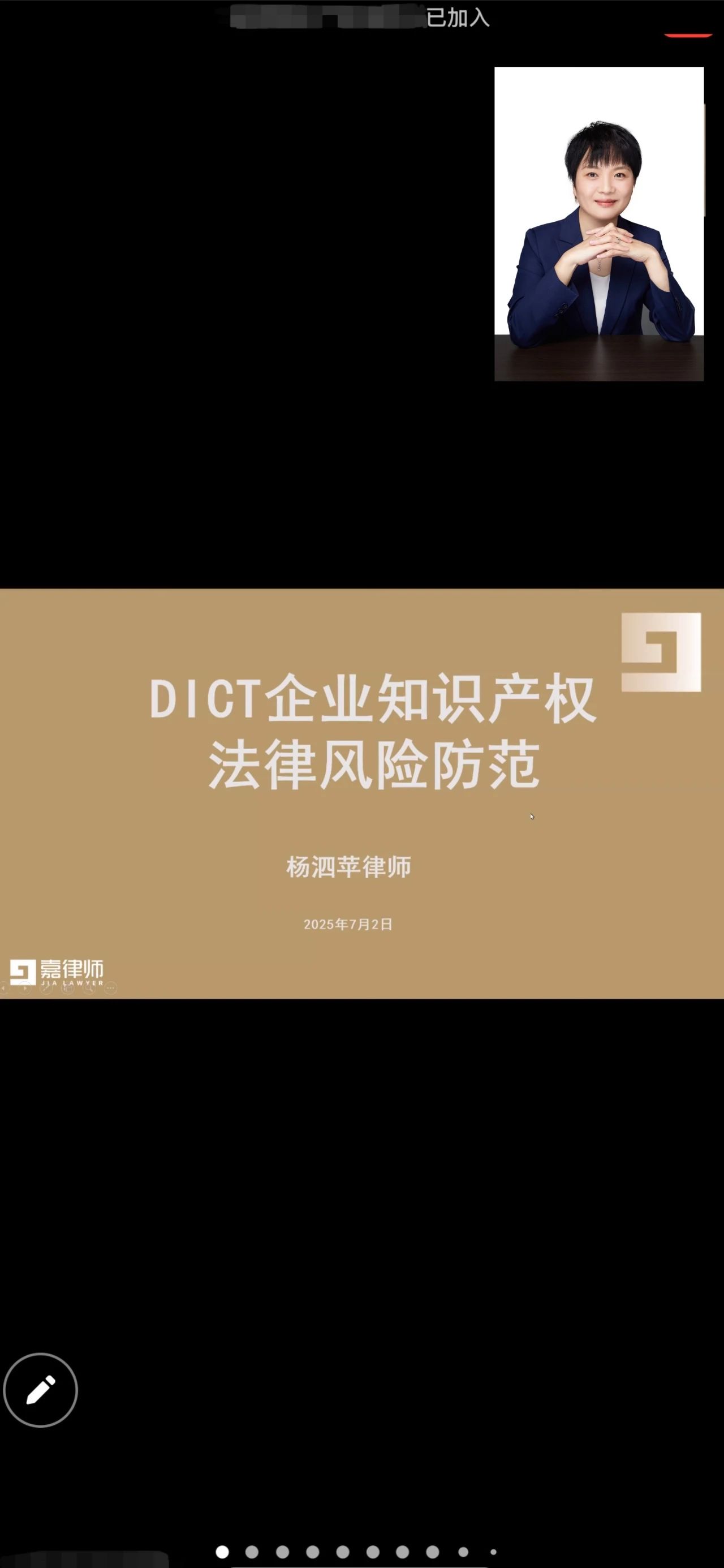Enabling Central Enterprises to Build Compliance and Intellectual Property Defense.
Recently, at the invitation of CMCC Beijing Branch (hereinafter referred to as “CMCC Beijing Branch”), which is a permanent legal consultant, Mr. Yang Siping of Jiawei Law Firm gave an in-depth training on the topic of “Prevention of Intellectual Property Risks in DICT Enterprises” to nearly one hundred leaders and employees in core positions of the company. The training focused on the risks faced by enterprises in the era of digital economy. The training focused on the cutting-edge legal challenges faced by enterprises in the era of digital economy, and received enthusiastic responses and was highly evaluated by the participants.


Serving Head Clients and Demonstrating Jiawei Law Firm's Strength
CMCC Beijing Branch, as an important force in the communications industry, is highly dependent on information technology and digital transformation (DICT) for its business. The company chose Jiawei Law Firm as its permanent legal advisor and invited Mr. Yang Siping to conduct special training, which fully reflects the large central enterprise's high recognition of Jiawei Law Firm's professional strength and service quality. Being able to continue to provide high-quality legal services for such heavyweight clients is a strong proof of the comprehensive strength and industry influence of Jiawei Law Firm. We are deeply honored and will continue to provide professional, efficient and forward-looking legal services to escort our clients' steady development in the complex business environment.
Focusing on cutting-edge issues, Mr. Yang Siping demonstrated his profound professional background
This training was led by Mr. Yang Siping, who has been working in the field of intellectual property rights for nearly 20 years. Relying on his rich practical experience and profound theoretical background, Mr. Yang presented a feast of informative and practical knowledge to the participants by combining the hotspots of the current technological development with the latest developments in judicial practice.
The content of the training closely followed the actual business of CMCC Beijing Branch, and centered on two modules, namely, “Core Legal Risks and Prevention of DICT Project” and “Copyright Protection and Risk Prevention: Taking ‘Emoticon Packets’ as an Example”. "The two modules are carried out:
1. In-depth analysis of DICT project risks: Supplier management minefield: in-depth analysis of key risk points and prevention strategies, such as incompatible supplier qualifications, loopholes in contract terms (e.g., unclear attribution of intellectual property rights, lack of confidentiality obligations), and limitations on affiliation. Intellectual Property Infringement Traps: Early warning of high-frequency risks such as infringement of proxy procurement equipment, open source code compliance in software integration, and infringement of data usage (especially AI training data), and clarification of the consequences and countermeasures in combination with typical cases at home and abroad (e.g., GPL infringement case of open source software). Data Security and Privacy Compliance: Explain the core requirements of the Data Security Law and the Personal Information Protection Law, and emphasize the considerations of personal information processing compliance and cross-border data transfer (e.g., GDPR). Technical delivery and quality dispute resolution: emphasize the importance of clear acceptance standards and effective technical measures (e.g., encryption, digital watermarking) to protect your intellectual property rights.
2. Prevention of Copyright Risks “From Small to Big”: Taking “emoticons” as a vivid starting point: systematically sorting out the types of emoticons (cartoon/lifelike) and their possible risks of compound infringement of copyright, portrait right, honor right, privacy right, and so on. Typical cases: Combining “Ge You Lie”, “Mushroom Head”, “Little Chai”, “Long Grass Face Group”, “Nomengjun and Xiaolonggrin” and other well-known real judicial precedents, visualizing the legal consequences of infringement (high compensation, loss of goodwill), and analyzing the core points of determining the ownership of the work, originality and substantial similarity in judicial practice. Clarify the boundary of “reasonable use”: clearly interpret the provisions of Article 24 of the Copyright Law on reasonable use, and point out the common invalid defenses (e.g., “the time of use comes first”) through actual cases (e.g., infringement of the use of the commercial promotion of an enterprise's public number), “non-profit purpose”, “publicity in official media” and other defenses). Practical guide to avoiding the pitfalls: Practical risk prevention suggestions are provided, such as obtaining authorization, strengthening internal auditing (reviewing the source of image rights), and enhancing legal awareness and media literacy.
Especially noteworthy is that Mr. Yang focused on analyzing the copyright disputes and platform liability of AI-generated content (AIGC), which is currently the most cutting-edge issue in the training:
Combined with the “AI text-generated picture first case” of Beijing Internet Court (the Spring Wind case) and the “Wings of Illusion case” of Suzhou Intermediate Court (the AI does not constitute the Wings of Illusion case), the training provided a practical guide to avoid the pitfalls. In the light of the comparative analysis of the “First AI text-generated picture case” (Spring Breeze case) of the Beijing Internet Court and the “Phantom Wings case” (AI does not constitute a work) of the Suzhou Intermediate Court, we explain the key role of the core criterion for determining whether an AI-generated work constitutes a work in the judicial practice - the “original intellectual input of human beings” and emphasize the importance of preserving the complete It also emphasizes the importance of preserving the complete chain of evidence of the creative process. Explaining the landmark significance of the world's first AIGC platform infringement case (“Ultraman” case) in Guangzhou Internet Court, clarifying the direct infringement liability of AI service providers for the infringing content generated by their platforms and their legal obligation to deploy effective anti-copyright infringement filtering measures. Mr. Yang also shared the compliance requirements of domestic and international legislation (e.g. China's Interim Measures for the Administration of Generative Artificial Intelligence Services and the EU's Artificial Intelligence Act).
Mr. Yang's in-depth explanations and vivid cases transformed complex legal issues into practical points that are easy for enterprises to understand and operate, effectively enhancing the participants' ability to identify and prevent intellectual property risks. The training site interaction is active, the participants encountered in the work of the actual legal confusion and high-frequency risk points, and Yang lawyer for in-depth exchanges and discussions.
Choose Jia Lawyer, choose the escort expert in the field of intellectual property rights

Siping Yang is a representative attorney in the intellectual property practice of Jiali & Partners, whose areas of expertise cover the entire chain of trademarks, copyrights, trade secrets, anti-unfair competition, intellectual property litigation and the emerging AIGC legal risk management. She not only has a profound legal education background from the China University of Political Science and Law, but is also active in the forefront of international intellectual property protection, serving as the co-chair of the International Trademark Association (INTA) Communications Committee in China and a member of the Trademark Committee of the International Association for the Protection of Intellectual Property (AIPPI) China Chapter.
With nearly 20 years of in-depth cultivation, Ms. Yang and her team have provided effective IP strategy planning, risk prevention and control, and dispute resolution services for many domestic and foreign well-known enterprises, especially in handling complex, difficult and new IP cases, and have accumulated rich experience and achieved excellent results.
In the future, Jialu Law Firm, Siping Yang and her team will continue to provide forward-looking risk warning and systematic solutions for the intellectual property assets of their clients with their exquisite professional ability, rich practical experience and forward-looking industry vision, helping enterprises to manage the legal risks in the digital era and to be steady and far-sighted in the innovation and competition.


© Beijing JAVY Law Firm Beijing ICP Registration No. 18018264-1